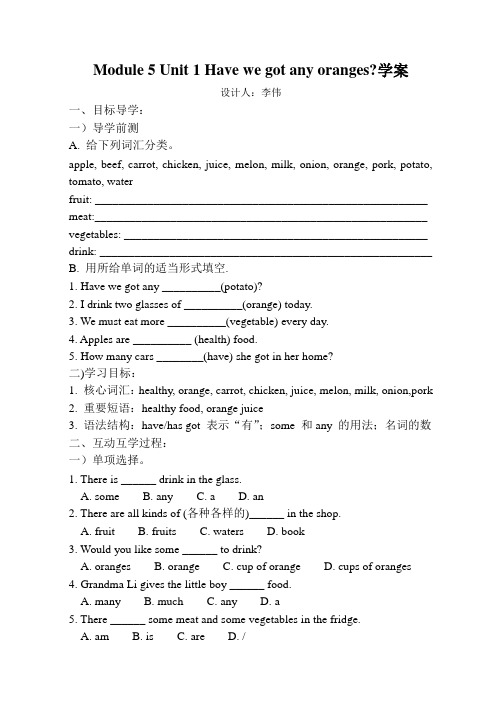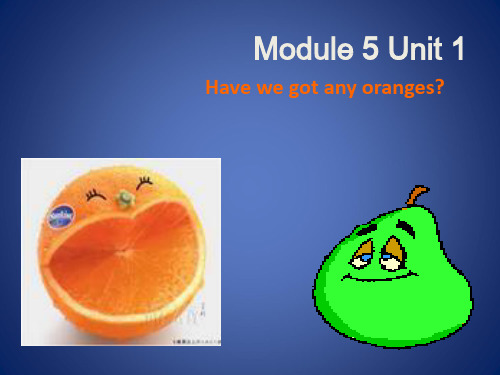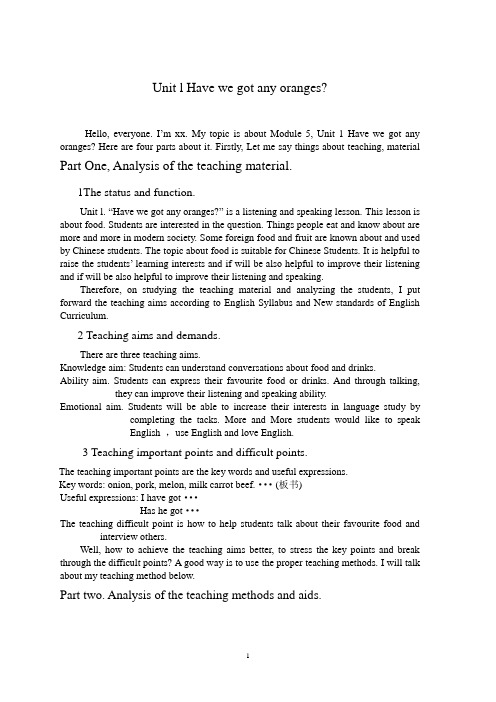1 Have you got any oranges 外研英语
八年级英语外研版上册Module 5 Unit 1 Have we got any oranges学案

Module 5 Unit 1 Have we got any oranges?学案设计人:李伟一、目标导学:一)导学前测A. 给下列词汇分类。
apple, beef, carrot, chicken, juice, melon, milk, onion, orange, pork, potato, tomato, waterfruit: _________________________________________________________ meat:_________________________________________________________ vegetables: ____________________________________________________ drink: _________________________________________________________B. 用所给单词的适当形式填空.1. Have we got any __________(potato)?2. I drink two glasses of __________(orange) today.3. We must eat more __________(vegetable) every day.4. Apples are __________ (health) food.5. How many cars ________(have) she got in her home?二)学习目标:1. 核心词汇:healthy, orange, carrot, chicken, juice, melon, milk, onion,pork2. 重要短语:healthy food, orange juice3. 语法结构:have/has got 表示“有”;some 和any 的用法;名词的数二、互动互学过程:一)单项选择。
Module 5 Unit 1《Have you got any oranges》课件3(22页)(外研版七年级上)

Yes, I have four milks.
X
Have you got any milk? Yes, I have some.
practice
1. There are some___t_o_m__a_to_e(西s 红柿) on the desk.
2. _V_e_g_e_t_a_b_le_s_(蔬菜) are good for us. 3. Have you got any ____m__e(a肉t )? 4. We haven’t got any ____fr_u_i(t水果). 5. These __c_a_rr_o_t(s胡萝卜) are from Xinjiang. 6. Lily has got some _______(果汁).
Module 5 Unit 1
Have we got any oranges?
oranges • Have you got any apples ?
water
• Yes, I have. • No, I haven’t.
Have you got any …? Yes, I have./ No, I haven’t.
A
B
Chicken
milk
coke
pork
Beef
water
X Have you got any chickens?
Yes, I have got two chickens.
Have you got any chicken? Yes, I have got some.
Have you got any milks?
Betty’s mum: Have we ___g_o_t_ acnayrrots? Betty: Yes, ____w_e’vgeot some carrots. Have we got any ____?meat
Module4 unit 1Have you got any oranges教学设计

七年级英语上册(外研版)M5U1Module 5 Healthy food Unit 1Have you got any orange?一、说教材:1、本课时的教学内容是外研版七年级上册,Module 5 Healthy Food的Unit 1Have you got any orange?Module 5Unit1 是关于饮食的话题。
通过本课时的学习,学生用英语表达出食品和饮料,根据所掌握的英语词汇进行简单的日常饮食会话。
在教授词汇当中,让学生掌握可数名词和不可数名词,了解some 和any 及have /has got 的基本用法,这一课时为后面关于健康饮食的话题的展开打下基础,在本模块中的地位是举足轻重的。
2、教学目标:①知识目标: 理解和掌握有关食物和饮料的词汇,并能够进行简单的对话;②能力目标: 提高有关健康饮食话题的听力能力,提高谈论饮食话题的口语能力。
③情感目标: 学生在区分healthy food and unhealthy food 的同时,培养了他们健康饮食的良好习惯。
3教学重点:(1) 掌握语言结构——have/has got.(2) 掌握some和any的用法.(3) 掌握食物和饮料的词汇,并区分其可数还是不可数。
.4教学难点: 可数名词与不可数名词.5教法利用启发式教学法、任务型教学法、情景教学法等。
设计理念:在课堂里,我根据教材内容设计出的不同课堂活动任务(task), 根据设计出的不同任务给出相应的提示,引导学生进行pair work 和group work 的训练活动,而且还给学生留出思维想象的空间,启发学生动脑思考(brain—storming), 这样不仅有利于发展学生的求同思维(convergent thinking),更有利于发展学生的求异思维( divergent thinking),也就是发展学生的创新能力。
二、说学情:谈论食物和饮料的话题很贴近生活,学生对此话题很感兴趣,但对其缺乏感性的认识。
外研版英语七上Module5Unit1Haveyougotanyorangesword教案

Unit 1 Have you got any oranges1. Listen again, complete the table and make up a Array dialogue according to the table.Pair workA: Have we got any…?B: Yes, we have got… No, we haven’t…Change these words into plurals.apple melon orange onion carrot potato tomato2. some 和any 区别There is some milk in the cup.I have got some nice monkey stamps.We haven’t got any English classmates.Has he got any sisters?Is there any good news today?你能总结一下some和any 的用法吗?some 用于______________中,any用于___________和_____________some 和any 既可用于可数名词的________________之前,也可用于不可数名词之前。
可数名词若是是单数,加不定冠词,而不可数名词只要表示必然的量就要加________或________.拓展1. some要紧用于____________中。
① 当说话人期待肯定回答或者有意图鼓励说话人作肯定回答时,some可用于疑问句。
Could I have ________more bread, please? 我多拿一些面包可以吗?Would you like __________ more soup? 你还要点汤吗?② some 与单数可数名词搭配,表示未知的人或物,相当于a (an) 或a certain。
外研版-英语-七年级上-1单元 Have you got any oranges(学案)

Module5Unit1. Have you got any oranges?学习目标:To understand conversations involving food and drink To talk about food 学习重点:1.预习P26—27单词2重点短语:orange 一个橘子some 一些水果some ______一些牛肉some 一些洋葱some_______一些西红柿3.重点句子______we got ______juice? 我们有没有果汁?We_____got______milk. 我们没有牛奶。
We______got______carrots. 我们有一些胡萝卜。
要点讲解:Have we got any oranges?①orange作“橘子”讲时,为可数名词There are some oranges in the basket. 篮子里有一些橘子。
②orange作“橘子汁”讲时,为不可数名词。
There is some orange in the bottle. 在瓶子里有一些橘子汁。
③orange还用作形容词,意为“橙色的”Lucy’s skirt is orange. 路西的裙子是橙色的。
课堂练习Ⅰ.根据句首及字母提示补全单词。
1.There are some o______and apples here for you.2.Chicken, potatoes and melons are h_____food.3.Pork and b_____are meat.4.Tom likes v ______very much, like carrot.k and water are healthy d______.Ⅱ.单项选择1.There is _____ juice in the bottle.A.anB.aC.someD.any2.We have some _____ in the fridge(冰箱).A.meat B.meats C.juices ks3.There is some _____ in the bottle.A.rice B.apples C.apples juice D.apple juice4.There are all kinds of _____ in the shop.A.fruit B.fruits C.breads D.book5.There are many _____ and _____ on the table.A.tomatoes;photosB.tomato;photoC.tomatos;photosD.tomatoes;photos6.—Have we got _____egga? ----No,we haven’t got ____.A.some;someB.any;anyC.some;anyD.any;some7.Would you like some _____to drink?A.orangesB.orangeC.cup of orangeD.cups of oranges8.There aren’t any _____ in the basket. A.pork B.beef C.melons k9.---Would you like _____ coffee? ---Yes,please.A.someB.anyC.manyD.a10.---Have they got any apples? ---_____.Can you give them some?A.Yes,they haveB.No,they haven’tC.Yes,we haveD.No,I haven’tⅢ.根据汉语意思完成句子1.他们有一些果汁。
Have we got any oranges PPT课件 外研版

Listen and check (√) the food and drink
they’ve got. (Activity 4)
oranges √ beef
onions
apples √ pork
carrots
melons
tomatoes √ milk
chicken √ potatoes √ juice
•
70、当你的希望一个个落空,你也要坚定,要沉着!
•
71、生命太过短暂,今天放弃了明天不一定能得到。
•
72、只要路是对的,就不怕路远。
•
73、如果一个人爱你、特别在乎你,有一个表现是他还是有点怕你。
•
74、先知三日,富贵十年。付诸行动,你就会得到力量。
•
75、爱的力量大到可以使人忘记一切,却又小到连一粒嫉妒的沙石也不能容纳。
•
39、人的价值,在遭受诱惑的一瞬间被决定。
•
40、事虽微,不为不成;道虽迩,不行不至。
•
41、好好扮演自己的角色,做自己该做的事。
•
42、自信人生二百年,会当水击三千里。
•
43、要纠正别人之前,先反省自己有没有犯错。
•
44、仁慈是一种聋子能听到、哑巴能了解的语言。
•
45、不可能!只存在于蠢人的字典里。
•
1、再长的路一步一步得走也能走到终点,再近的距离不迈开第一步永远也不会到达。
•
2、从善如登,从恶如崩。
•
3、现在决定未来,知识改变命运。
•
4、当你能梦的时候就不要放弃梦。
•
5、龙吟八洲行壮志,凤舞九天挥鸿图。
•
6、天下大事,必作于细;天下难事,必作于易。
新概念英语第一册课后练习题及答案:109-110

新概念英语第一册课后练习题及答案:109-110Written exercises书面练习A Complete these sentences using much, many, less or fewer.完成以下句子,用much, many, less或fewer填空。
1 I haven't got any pens. I haven't got ______either.2 I've got some money. I've got ______ than you have.3 I haven't got any money. I haven't got ______ either.4 I've got some books. I've got______ than you have.B Answer these questions.模仿例句回答以下问题。
Examples:Have you got any coffee? ---- I haven't got much coffee.I've got very little.Have you got any biscuits? ---- I haven't got many biscuits. I've got very .1 Have you got any jam?2 Have you got any potatoes?3 Have you got any oranges?4 Have you got any vegetables?5 Have you got any meat?6 Have you got any money?C Write new sentences.模仿例句将以下句子改成比较级。
Example:I've got some coffee.I've got mare coffee than you have.1 I've got some soap.2 I've got some fruit.3 I've got some books.4 I've got some presents.5 I've got some eggs.6 I've got some stationery.D Write new sentences.模仿例句改写以下句子。
外教研版英语Unit l Have we got any__ oranges

Unit l Have we got any oranges?Hello, everyone. I’m xx. My topic is about Module 5, Unit 1 Have we got any oranges? Here are four parts about it. Firstly, Let me say things about teaching, material Part One, Analysis of the teaching material.1The status and function.Unit l. “H ave we got any oranges?” is a listening and speaking lesson. This lesson is about food. Students are interested in the question. Things people eat and know about are more and more in modern society. Some foreign food and fruit are known about and used by Chinese students. The topic about food is suitable for Chinese Students. It is helpful to raise the students’ learning interests and if will be also helpful to improve their listening and if will be also helpful to improve their listening and speaking.Therefore, on studying the teaching material and analyzing the students, I put forward the teaching aims according to English Syllabus and New standards of English Curriculum.2 Teaching aims and demands.There are three teaching aims.Knowledge aim: Students can understand conversations about food and drinks.Ability aim. Students can express their favourite food or drinks. And through talking, they can improve their listening and speaking ability.Emotional aim. Students will be able to increase their interests in language study by completing the tacks. More and More students would like to speakEnglish ,use English and love English.3 Teaching important points and difficult points.The teaching important points are the key words and useful expressions.Key words: onion, pork, melon, milk carrot beef.···(板书)Useful expressions: I have got···Has he got···The teaching difficult point is how to help students talk about their favourite food and interview others.Well, how to achieve the teaching aims better, to stress the key points and break through the difficult points? A good way is to use the proper teaching methods. I will talk about my teaching method below.Part two. Analysis of the teaching methods and aids.1Analysis of the students.Students are the most important part in the class, so we must make our teaching atmosphere relaxing and happy to make the students as hosts in the class So I must conduct them correctly and try to improve their abilities of listening, speaking, reading and writing.2 The teaching method.In this lesson, some important teaching methods will be used by me. Such as, “Communicative”teaching method, “Audiovisual”teaching method, “Task—based”teaching method and “Listening and saying” teaching method. Because it’s well—known that the main instructional aim of learning English in the Middle School is to cultivate students’ abilities of listening, speaking, reading and writing and their good sense of the English language.3 Teaching aidsBlackboard, tape, recorder, multi—media computer.In order to realize the teaching procedure systematically and properly, I have disigned the following steps to train the students' ability of listening, speaking, reading and writing, especially speaking ability.Part Four Teaching procedures.Step 1 Warming up.Let students have a free talk, then tell us what she or he had yesterday. Is it your favourite food? (Heat the classroom’s atmosphere.)Step 2 Lead in.Introduce some interesting facts to them.①7% of Americans eat in McDonalds every day.②Britain’s most popular snack food is potato crisps.③The largest hamburger in the world weighed 2,503Kg.The purpose is to let students know some interesting facts and train their listening abilities.Step 3. learn the new words, identify the countable and uncountable words.The method is using the multi—media computer. Show a scene to the students.There is a teacher and his students in a big supermarket. There are all kinds of things in it When they get into the food section suddenly one student points at onions and asks, “Sir, What are they?” The teacher tells them, “They are onions.” And let them count how many onions there are. One onion, two onions, three onions···Then teacher introduce some other things to them, such as beef, pork, carrots···In this part, the teacher must let students identify which words are countable, which are not. If the students can’t understand, teacher can give them some examples. We can say one apple, two apples, one pen, two pens, but we can say one beef, two beefs, one milk, two milks. So pen, apple are countable nouns, beef, milk are uncountable nouns.It is much easier for students to understand the words, and grasp the grammar by watching and listening. And if they can identify the countable and uncountable words, later, they can use “some” or “any” easily.Step 4 PracticeHere are two tasksThe first one: Suggest the students to make vocabulary lists with words arranged in related groups. (Explain that it is much easier to remember words when similar ones are together, rather than when there is a random list.) Thus they could have a page in their notebook with a heading FOOD. Then different groups of words with subheadings (eg, meat) and then the specific words (eg, chicken, pork, beef`···) They can then add to this list when they find other related words.( 教师可事先准备好写有单词的卡片,让学生放进适当的表格中。
- 1、下载文档前请自行甄别文档内容的完整性,平台不提供额外的编辑、内容补充、找答案等附加服务。
- 2、"仅部分预览"的文档,不可在线预览部分如存在完整性等问题,可反馈申请退款(可完整预览的文档不适用该条件!)。
- 3、如文档侵犯您的权益,请联系客服反馈,我们会尽快为您处理(人工客服工作时间:9:00-18:30)。
Listen and read. Betty’s mum: Have we got any juice? Betty: Yes, we’ve got some juice. We haven’t got any milk . Betty’s mum: Have we got any carrots? Betty: Yes, we’ve got some carrots . Have you got any meat ?
外研 初一 Module 5
Module 5 Unit 1 Have we got any oranges 广东 张佳望
Food and drink
fruit
water melon
apple
pear
orange
meat
pork
beef
chicken
fish
vegetables
tomato pl. tomatoes potato pl. potatoes
3. Label the food and drink in activity 1 with these words . apple beef carrot chicken juice melon milk onion orange pork potato tomato water
The keys:
Yes, I have got some books./ No, I haven’t got any books. 是的,我有一些书。/ 不,我没有书。 在表示希望得到对方肯定的回答时, some可用于疑问句中. Could you give me some help ? 你能帮帮我吗?
Can I ask you some questions ? 我可以问你一些问题吗? Could I have some oranges ? 我可以要一些桔子吗?
He is in good / poor health. 他身体健康/不健康。 ( be in good /bad health身体健 康/不健康 )
2. some 与any的用法 some 和any 都可以表示“一些;若 干”。Some用于肯定句;any 用于 疑问句、否定句、条件状语从句 中。 eg: Have you got any books ? 你有一些书吗?
Listen and check ( ✓) the food and drink they’ve got.
✓ beef oranges □ ✓ pork apples □
□ onions □ □ carrots □ □ □
✓ milk melons □ tomatoes □ chicken □ ✓ potatoes □ ✓ juice
carrot pl. carrots onion pl. onions
演 稿
示
文
1 2 3 后
等
云米网www.yunmi.ee域名资讯 域名走势 嶋幷夻
drink
water
milrs. Match the words with the pictures in Activity 1. 2. Label the food in the pictures in Activity 1 with these words. fruit meat vegetables
Now work in pairs. Ask and say what you’ve got. Have you got any … ? Yes, I’ve got some…/ No, I haven’t got any … Wb. Ex. 4 , 5 &6
a. melon b. apple d. chicken e. beef g. tomato h. potato j. onion k. water m. juice 1. fruit 2. vegetables c. orange f. pork i. carrot l. milk 3. meat
Betty’s mum: No, we haven’t . Have we got any melons ? Betty: Yes, we’ve got some melons. We haven’t got any apples.
Listen again and underline the correct answers in Activity 6. 1. They’ve got some juice / milk. 2. They haven’t got any carrots/meat. 3. Have they got any melons ? Yes, they have./ No, they haven’t. 4. Have they got any apples ? Yes, they have./ No, they haven’t.
Important and difficult points
1. healthy adj. 健康的
health
n. 健康
The children all look healthy. 孩子们看上去都很健康。 He is healthy.他很健康。 We should keep healthy. 我们应该保持身体健康。
当any 表示“任何”时,可用于肯 定句中,修饰单数名词。 eg: Any boy can do it . 任何小孩都能做这件事。
Pronunciation and speaking
Listen and repeat the words in Activity 7. Choose six words in the list in Activity 4. Orange , juice…
